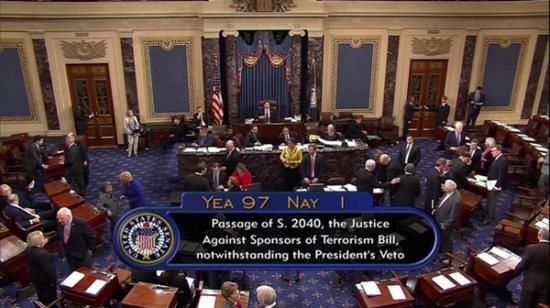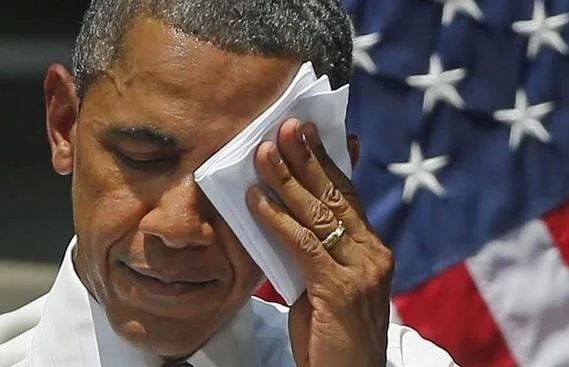On Sept 28, the U.S. Congress overwhelmingly rejected (97-1 in the Senate, 348-77 in the House) President Barack Obama’s veto of a bipartisan bill that would let families of 9/11 victims sue the Saudi Arabian government. This rare veto override is not only the first such setback for the White House since Obama took office, but will inevitably exacerbate his lame-duck status in his remaining days in the White House. More important, passing the bill will further worsen the US-Saudi relationship, perhaps critically.

2016年9月28日,美国参议院以97比1的投票结果推翻了奥巴马总统对允许“9·11”恐怖袭击事件幸存者和遇难者亲属起诉沙特阿拉伯政府的法案的否决。
First, given that the U.S. Congress forcefully passed the Justice against Sponsors of Terrorism Act, its approval is tantamount to pushing Saudi Arabia from being a U.S. ally to an enemy. Allowing 9/11 victims and their families to sue Saudi Arabia is telling the Saudi government to take responsibility for the attacks. Since 15 of the 19 hijackers in the attacks were Saudis, some victim families have insisted Riyadh should be held accountable because al-Qaeda received financing from Saudi Arabia. The Rand Corporation even suggested the U.S. government identify Saudi Arabia as an “enemy of the U.S.” Over the past 15 years,9/11 survivors and victim families launched litigation against the Saudi government in American courts and asked for compensation. But the George W. Bush administration, considering U.S. strategic needs in the Middle East, played down concerns with the Saudi authorities, and American courts rejected such cases on the ground that the Saudi government has sovereign immunity. By depriving the Saudi government of that immunity, the bill has effectively broken through the last layer of protective film for US-Saudi relations, not only putting the Saudi government in a difficult position, but also exposing all US military personnel deployed overseas to similar threats. Other countries could follow the example, deny US sovereign immunity, and sue overseas US service people, which was an important reason for Obama’s veto.

Second, passage of the act also indicates cornerstones supporting U.S.-Saudi relations have collapsed one by one, as the “inward-looking” election-year attitudes have transcended “outward-looking” support for “international strategies”. Over the past decades, the solid US-Saudi alliance has been based on “oil for security”, i.e. Saudi Arabia provides the US with oil in exchange for an American security guarantee. Yet the grounding of those strategic interests has loosened thanks to breakthroughs in shale-gas technology in the US and a corresponding decline in US dependence on Middle East petroleum. Abrupt drops in international petroleum prices in recent years are widely seen as of the result of a fateful competition in the global energy resources market between Saudi oil and US shale gas. On the security front, the Obama administration ignored Saudi and Israeli opposition and made every effort to reach the agreement on the Iran nuclear issue, diminishing the security advantages of the Saudi-led camp of Sunni countries (including Egypt, six Persian Gulf countries, Jordan and Yemen) over the Iran-led Shiite camp (including Iraq, Syria and the Hezbollah), leaving the geopolitical gaming for strategic dominance in the Middle East to tilt in Iran’s favor. Meanwhile, on the Syria issue, the Obama administration’s shilly-shally and inaction has also irked the Saudi government, so much so that the Saudi government, who is determined to overthrow the Bashar al-Assad regime, has to come out to the forefront to arm the opposition forces in Syria, and rally countries to formulate an “anti-Bashar alliance”.

The decline of Saudi Arabia’s importance for the US is also reflected in American disregard of Riyadh’s various shows of discontent. For example, when Saudi Arabia refused to be a non-permanent member of the United Nations Security Council, and months before the US Congress voted to pass the act, Saudi Foreign Minister Adel al-Jubeir had warned if the bill was approved, his country would dump as much as $750 billion of US Treasury bonds and other dollar assets. The Treasury announced that Saudi Arabia held only $100 billion-plus in Treasury bonds, and the threatened sell-off’s impact on the American economy would be negligible. Weighing Riyadh’s threat, the US Congress seemed more concerned about election-year conditions at home. Preserving the alliance with Saudi Arabia was seen as less important than preserving relations with 9/11 survivors and their families, protecting U.S. interests in the Middle East less important than protecting the human rights of domestic voters and being morally correct. However, if U.S. foreign policy is allowed to be dominated by such “inward-looking election-year motivation”, US anti-terror strategy is unlikely to continue to enjoy full support from Saudi Arabia. With traditional U.S. allies like Saudi Arabia and Israel beginning to engage Russia in private, it would help Moscow intervene in and influence Middle East affairs. The U.S., which has traditionally dominated Middle East affairs, may be elbowed out from the area sooner or later.
(本文作者系察哈尔学会高级研究员,原载于中美聚焦)